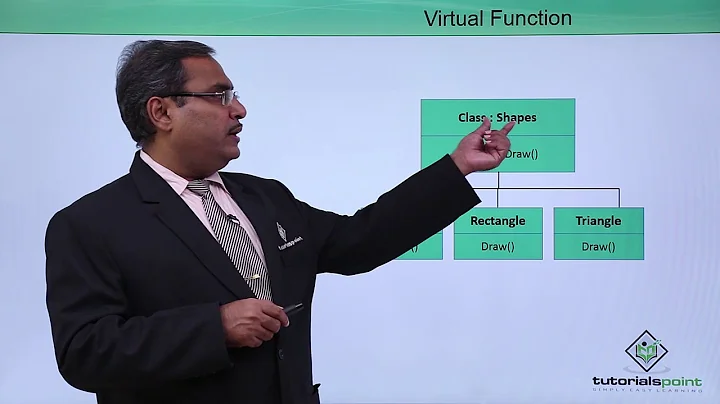Is the 'override' keyword just a check for a overridden virtual method?
Solution 1
That's indeed the idea. The point is that you are explicit about what you mean, so that an otherwise silent error can be diagnosed:
struct Base
{
virtual int foo() const;
};
struct Derived : Base
{
virtual int foo() // whoops!
{
// ...
}
};
The above code compiles, but is not what you may have meant (note the missing const). If you said instead, virtual int foo() override, then you would get a compiler error that your function is not in fact overriding anything.
Solution 2
Wikipedia quote:
The override special identifier means that the compiler will check the base class(es) to see if there is a virtual function with this exact signature. And if there is not, the compiler will error out.
http://en.wikipedia.org/wiki/C%2B%2B11#Explicit_overrides_and_final
Edit (attempting to improve a bit the answer):
Declaring a method as "override" means that that method is intended to rewrite a (virtual) method on the base class. The overriding method must have same signature (at least for the input parameters) as the method it intends to rewrite.
Why is this necessary? Well, the following two common error cases are prevented:
one mistypes a type in the new method. The compiler, unaware that it is intending to write a previous method, simply adds it to the class as a new method. The problem is that the old method is still there, the new one is added just as an overload. In this case, all calls towards the old method will function just as before, without any change in behavior (which would have been the very purpose of the rewriting).
one forgets to declare the method in the superclass as "virtual", but still attempts to re-write it in a subclass. While this will be apparently accepted, the behavior won't be exactly as intended: the method is not virtual, so access through pointers towards the superclass will end calling the old (superclass') method instead of the new (subclass') method.
Adding "override" clearly disambiguates this: through this, one is telling the compiler that three things are expecting:
- there is a method with the same name in the superclass
- this method in the superclass is declared as "virtual" (that means, intended to be rewritten)
- the method in the superclass has the same (input*) signature as the method in the subclass (the rewriting method)
If any of these is false, then an error is signaled.
* note: the output parameter is sometimes of different, but related type. Read about covariant and contravariant transformations if interested.
Solution 3
Found "override" is useful when somebody updated base class virtual method signature such as adding an optional parameter but forgot to update derived class method signature. In that case the methods between the base and the derived class are no longer polymorphic relation. Without the override declaration, it is hard to find out this kind of bug.
Solution 4
Yes, this is so. It's a check to make sure one doesn't try an override and mess it up through a botched signature. Here's a Wiki page that explains this in detail and has a short illustrative example:
http://en.wikipedia.org/wiki/C%2B%2B11#Explicit_overrides_and_final
Solution 5
C++17 standard draft
After going over all the override hits on the C++17 N4659 standard draft, the only reference I can find to the override identifier is:
5 If a virtual function is marked with the virt-specifier override and does not override a member function of a base class, the program is ill-formed. [ Example:
struct B { virtual void f(int); }; struct D : B { virtual void f(long) override; // error: wrong signature overriding B::f virtual void f(int) override; // OK }— end example ]
so I think that possibly blowing up wrong programs is actually the only effect.
Related videos on Youtube
aiao
Embedded Software Engineer. Areas of expertise: AUTOSAR, Linux, Yocto, information security, dynamic controls and drones.
Updated on November 02, 2021Comments
-
aiao over 2 years
As far as I understand, the introduction of
overridekeyword in C++11 is nothing more than a check to make sure that the function being implemented is theoverrideing of avirtualfunction in the base class.Is that it?
-
 R. Martinho Fernandes over 11 yearsYes.
R. Martinho Fernandes over 11 yearsYes. -
 Nikos C. over 11 yearsIt's not a double check though. It's the only check.
Nikos C. over 11 yearsIt's not a double check though. It's the only check. -
aiao over 11 years@Nikos good point;), fixed
-
 KAlO2 over 10 yearshey, override is NOT a keyword, it's kind of a grammar sugar. int override=42; // OK
KAlO2 over 10 yearshey, override is NOT a keyword, it's kind of a grammar sugar. int override=42; // OK -
mots_g almost 10 yearsIt additionally improves readability explaining the declared function is overridden ;)
-
SasQ over 9 years@KAlO2: This makes me wonder what would happen if I define
int override;as a data member of my class ;-J Wouldn't this "not-a-keyword" conflict with that member then? -
SasQ over 9 yearsOr better: a member function called "override" :) e.g.
int override(float override) override {...}. What a mess... :D -
Cinch over 9 yearsSo, uh... When will C++11 become standard enough that they start teaching things like this at my local 4-year? When will they know?!
-
underscore_d almost 8 years@SasQ Of course
overrideas a regular identifier cannot conflict with theoverridespecifier, since the latter can only appear in one location, wherein the former can never be syntactically valid. That's precisely why they set it up this way, to enableoverrideandfinalto have special meanings in the single context where they matter, while not divesting users of the previously available ability to use them as normal identifiers.
-
-
 Lightness Races in Orbit almost 11 years+1: Though, unfortunately, it's a bit of a red herring when people suggest that the new
Lightness Races in Orbit almost 11 years+1: Though, unfortunately, it's a bit of a red herring when people suggest that the newoverridefeature "fixes" this; you have to remember to use it, just as you should have remembered to write theconst;) -
aschepler almost 11 yearsI just realized
explicitclass definitions didn't make it into C++11. Huh. -
Christian Rau almost 11 years@aschepler And what would an
explicitclass definition do? Never heard about that at all. -
legends2k over 10 years@LightnessRacesinOrbit: Yes, it's not fool proof; however, remembering a general rule (of madly writing
overridewhen one intends to do it) is more likely than remembering corner cases i.e. there's no generality in copying functions of different prototypes, only irregularities like missingconstor writingcharinstead ofint, etc. -
 Lightness Races in Orbit over 10 years@legends2k: I suppose.
Lightness Races in Orbit over 10 years@legends2k: I suppose. -
Kerrek SB over 7 years@LightnessRacesinOrbit: As much as I agree that most defaults in C++ are the wrong way round, I don't really see how you would change the "defaultness" of
override. Apply it to every function? That'd be nonsense. (And I think non-virtual by default is one of the few things C++ got right.) Apply it to allvirtualfunctions? That'd also get old really fast in all your base classes. A common style now is to use precisely one of virtual, override and final, whichever is strongest, and I'm not sure there's room for different defaults. Very much unlike withconst. -
 Lightness Races in Orbit over 7 years@KerrekSB: I never suggested doing either of those things.
Lightness Races in Orbit over 7 years@KerrekSB: I never suggested doing either of those things. -
Kerrek SB over 7 years@LightnessRacesinOrbit: No, of course, I just wanted to make it clear that even though you still have to remember to use
override, it's not necessarily the case that a better "fix" was missed, I think. -
 Lightness Races in Orbit over 7 years@KerrekSB: Indeed.
Lightness Races in Orbit over 7 years@KerrekSB: Indeed. -
iammilind over 7 years@Light, the best use case of
overridespecifier is mentioned in this answer, which is more futuristic than immediate. The answer suggests that, keep theoverridewith thevirtualmethod. In future when one mistakenly changes the signature, its usefulness kicks in. -
 Lightness Races in Orbit over 7 years@iammilind: Agreed.
Lightness Races in Orbit over 7 years@iammilind: Agreed. -
Disillusioned over 7 years+1. Though while
overrideis a great way to discover such problems, good unit test coverage should also help. -
 Cheers and hth. - Alf over 7 yearsUsing
Cheers and hth. - Alf over 7 yearsUsingvirtualin a declaration that also hasoverrideis counter-productive. It's more to write, and more to read. stackoverflow.com/a/39932616/464581 -
parsley72 about 7 yearsCore guideline C.128 states "Virtual functions should specify exactly one of virtual, override, or final." github.com/isocpp/CppCoreGuidelines/blob/master/…
-
Wolf over 6 yearsThat's exactly why I'm so excited about that new specifier. The only problem is that this feature has to be already applied as to prevent errors caused by changes in base classes. ;-)
![[MUC++] Vittorio Romeo - C++11/14 at Scale: What Have We Learned?](https://i.ytimg.com/vi/B7FGIFCyVEs/hq720.jpg?sqp=-oaymwEcCNAFEJQDSFXyq4qpAw4IARUAAIhCGAFwAcABBg==&rs=AOn4CLDICI45HrGmoyGVAqrAMA_aMweaTw)








